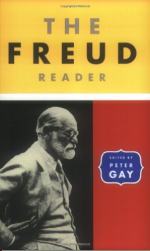
|
| Name: _________________________ | Period: ___________________ |
This test consists of 15 multiple choice questions and 5 short answer questions.
Multiple Choice Questions
1. What has likely happened to the translations of Freud's work?
(a) They are completely different.
(b) They have multiple versions.
(c) They have been proliferated.
(d) They have been changed from the original text.
2. What does Freud find causes symptoms of mental illness to subside?
(a) Letting the patient hit something.
(b) Allowing the patient and doctor to have a casual relationship.
(c) Listening attentively and compassionately.
(d) Telling the patient how to fix their problem.
3. What is one of the terms introduced that is one or a bundle of behavioral symptoms that shows something is 'wrong'?
(a) Psychology.
(b) Neuroses.
(c) Psychoanalysis.
(d) Hysteria.
4. According to Freud, how does he term the patient's experience with the grown man?
(a) Psychoanalysis.
(b) A moment of anxiety.
(c) A hysterical experience.
(d) A sexual trauma.
5. In psychology, what is a major form of organization and research?
(a) A case study.
(b) A draft.
(c) An outline.
(d) An experiment.
6. What does Freud state is the purpose for his work?
(a) To understand his mother's mental illness.
(b) To understand people's sexuality.
(c) To heal people through psychoanalysis.
(d) To analyze peoples way of thinking.
7. Which is not a section to the introductory material?
(a) Introduction.
(b) An Autobiographical Study.
(c) Preface.
(d) Dreams.
8. What is the norm for translated texts?
(a) For the author to translate it him or herself.
(b) For the publishing company to hire a translator to work with the author.
(c) For the translator to be referred to.
(d) For the translator to travel to the foreign country to learn colloquial terms.
9. What does Freud include about one's sexual preference?
(a) How to decipher one's sexual desire.
(b) The meaning of one's adolescent love is a forerunner of their future sexual preference.
(c) How to prevent inversion.
(d) How to prevent pregnancy.
10. What term is also defined by one or more symptoms in "The Theory of Sexuality"?
(a) Psychoanalysis.
(b) Hysteria.
(c) Psychology.
(d) Neuroses.
11. According to Freud, around what does the study of psychoanalysis revolve?
(a) The desire to want to get better.
(b) Replacement of pleasure principle by reality.
(c) Trusting one's therapist.
(d) Hypnosis.
12. What does Freud find as the cause of most neuroses?
(a) Fears of the unknown.
(b) Experiencing a death.
(c) Fears caused by actual events.
(d) Misconception of facts.
13. What does the editor explain about Freud in the Introduction?
(a) That he is from Austria and is Jewish.
(b) That he has the psychology of being an outsider.
(c) That he is homosexual.
(d) That he was an orphan.
14. What two feelings does Freud mention helps the therapy process?
(a) Hope and acceptance.
(b) Love and hope.
(c) Love and security.
(d) Acceptance and love.
15. Who is mentioned as one of Freud's intellectual mentors?
(a) Anna O.
(b) Charcot.
(c) Dora.
(d) Charcat.
Short Answer Questions
1. What is Dora in the chapter "Dreams"?
2. What does Freud say about children under 5 years old in "The Theory of Sexuality"?
3. What specific knowledge troubles 'Dora' ?
4. What type of change do sexual instincts undergo during this period of psychoanalysis?
5. In the chapter, "Dreams" what is the main concern dealing with dreams?
|
This section contains 587 words (approx. 2 pages at 300 words per page) |

|




